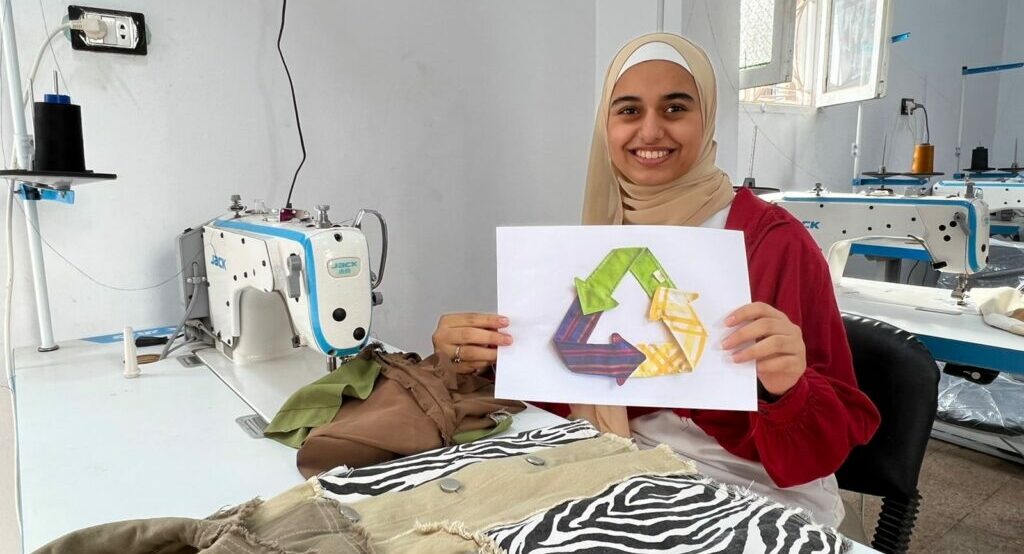March 7, 2024
A ray of hope emerges from Monofeya, one of Egypt’s most impoverished provinces, where an innovative business model is transforming lives and the environment against a backdrop of entrenched poverty. Green Fashion, co-founded by Amgad Moustafa, is championing sustainable fashion by breathing new life into textile waste, thereby creating a ripple of eco-friendly initiatives in a region where sustainable practices are often overshadowed by more immediate crises such as war and poverty.
Green Fashion has impressively upcycled approximately 940 tons (850 metric tons) of fabric over a span of merely five years, tapping into the textile remnants produced by 50 factories. This pioneering effort employs around 200 women who are trained to repurpose these materials that would otherwise contribute to environmental degradation through incineration or landfill disposal.
Egypt’s burgeoning garment industry, contributing 4% to the nation’s GDP, generates an estimated 234,000 tons (212,000 metric tons) of textile waste annually, according to a United Nations study. Globally, the fashion industry is notorious for its environmental footprint, consuming vast amounts of water and contributing significantly to pollution. Reports by McKinsey highlight that the industry is responsible for 3-10% of the world’s greenhouse gas emissions, a substantial portion of industrial water pollutants, and up to 35% of microplastic pollution in oceans. The United Nations has aptly termed fast fashion “an environmental emergency.”
In a landscape beleaguered by economic hardship, Egypt’s consumers are increasingly leaning towards recycled and upcycled clothing, finding innovative ways to make fashion both affordable and sustainable. Esraa Aburehab, a consultant in sustainability and environmental development, notes that the practice of reusing and repurposing clothes has deep roots in Egyptian culture, revived now by economic necessity.
"As mass production and fast fashion evolved, traditional sustainable practices faded," said Aburehab. "Yet, economic strains are reviving these age-old habits."
Rahma Youssef, a teacher from Suez, recounts her shift from frequenting Cairo’s malls to embracing thrift stores and custom-made clothing. The soaring prices of new garments have driven many like Youssef to repair and restyle older pieces, showcasing a community-wide return to sustainability.
Basma Tawakol, founder of the online thrifting platform Dayra, reveals that the demand for affordable, sustainable fashion spans across social strata. Since its inception in 2020, Dayra has offered an upcycled collection every few months, creatively combining various fabrics and old clothes. "Our customer base spans middle to upper classes," Tawakol observes, attributing this to the economic downturn necessitating budget-friendly alternatives.
Green Fashion’s operations hinge on salvaging defective fabric rolls and unwanted clothing, turning these into commercially viable products. “We once produced a thousand pieces from fabric waste and defective bolts,” Moustafa reminisces, noting that their production model ensures that one new garment is created out of every four preowned items.
However, Green Fashion’s contributions transcend environmental impacts; it empowers marginalized women with vocational skills. The enterprise offers a six-month training program in sewing and recycling, followed by supervised practice. This initiative has provided many women, like Sohair Asfour who transitioned from homemaker to skilled artisan, with financial independence, thus fostering both social and environmental progress.
Youssre Abdelkader, co-founder of the sustainable design initiative "From Waste to Good Taste,” highlighted the increasing popularity of workshops on repair and upcycling techniques among diverse age groups, emphasizing a growing communal embrace of sustainable fashion.
Expanding its mission, Green Fashion is setting up new production units in the governorates of Gharbia and Aswan, with ambitious plans to hire 300 more women and upcycle 1,000 metric tons (1,100 tons) of waste by the end of 2024. Moreover, a mobile fabric donation vehicle is set to traverse rural areas and universities, spreading the crucial message of sustainability far and wide.
"We aim to foster sustainability, one person at a time," asserts Moustafa.
This collaborative piece between Ensia and Egab sheds light on how local communities, even amidst pressing crises, are making significant strides in environmental conservation and social empowerment.
For further details on similar initiatives, click here and here.
Source: Ensia and Egab.
